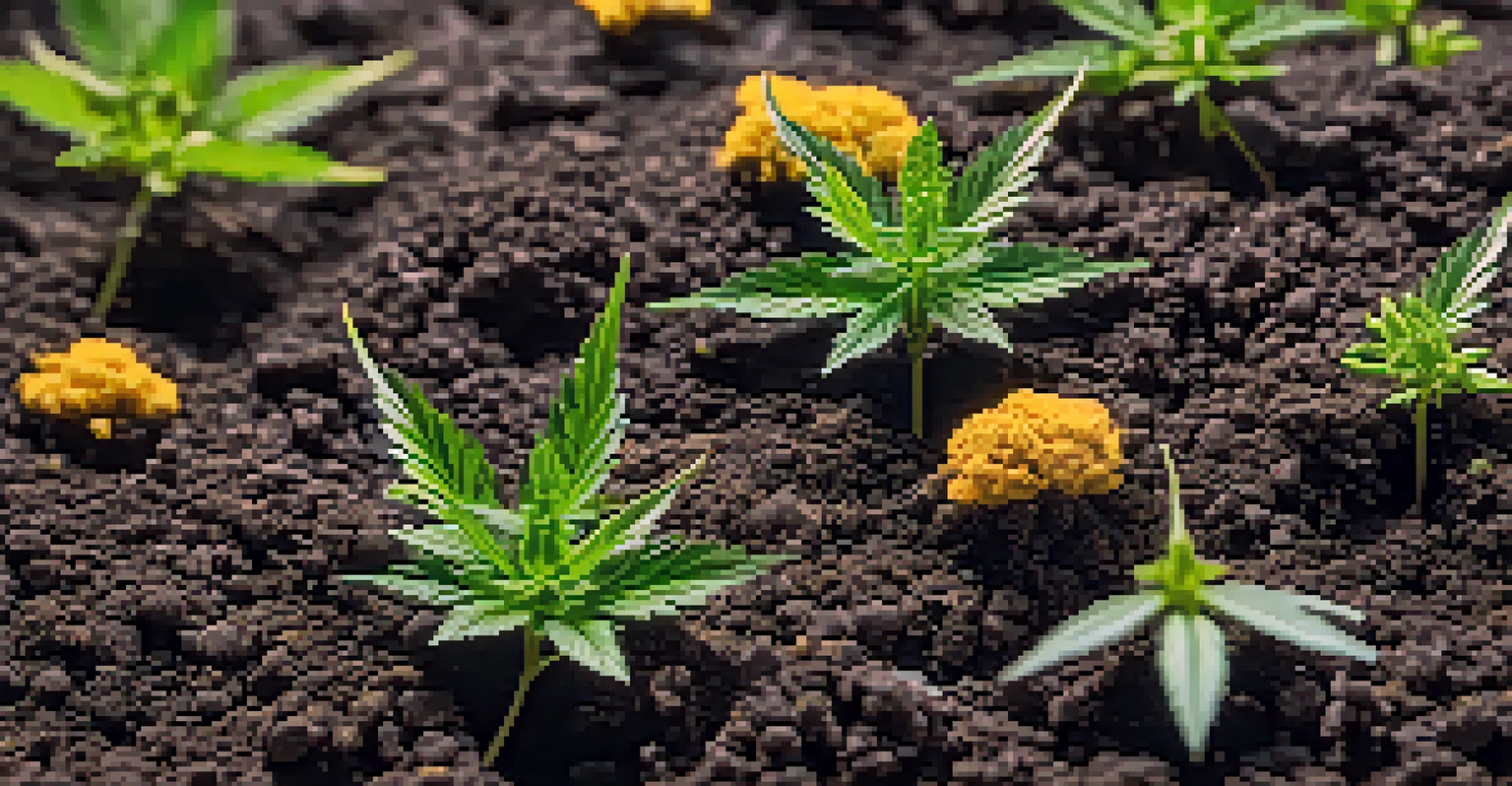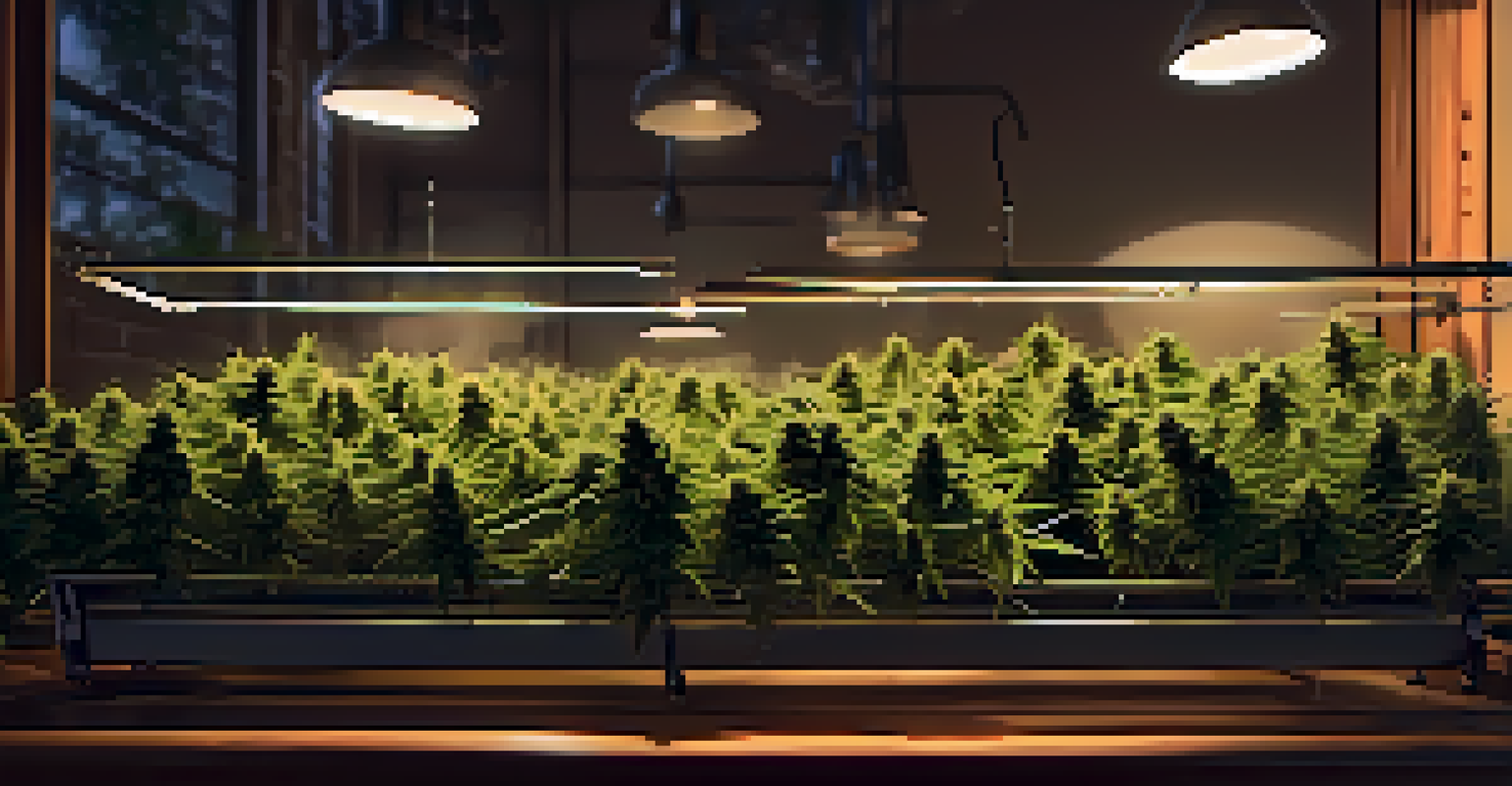Organic Marijuana Growing: Techniques for Sustainable Cultivation

Understanding Organic Marijuana Growing Basics
Organic marijuana growing focuses on cultivating cannabis without synthetic fertilizers or pesticides. This method enhances the natural flavors and aromas of the plant while promoting a healthier ecosystem. By prioritizing organic practices, growers help protect the environment, making it a sustainable choice for both the planet and consumers.
The greatest threat to our planet is the belief that someone else will save it.
Key principles of organic cultivation include using natural compost, crop rotation, and companion planting. These techniques work together to enrich the soil and improve plant health. For instance, planting garlic alongside marijuana can help deter pests naturally, reducing the need for chemical interventions.
Related Resource
Ultimately, understanding these basics is crucial for anyone looking to dive into organic marijuana growing. It’s not just about the product; it’s about fostering a responsible relationship with nature and ensuring the longevity of cannabis cultivation.
Choosing the Right Soil for Organic Cultivation
Soil is the foundation of any successful organic marijuana garden. The right soil provides essential nutrients while ensuring proper drainage and aeration. For organic growing, consider using a mix of compost, peat moss, and perlite to create a well-balanced medium that supports healthy root development.

Using organic soil amendments, like worm castings or bat guano, can also significantly enhance the nutrient profile of your soil. These natural fertilizers feed your plants while promoting beneficial microbial life in the soil. Healthy soil leads to robust plants that can thrive without synthetic additives.
Organic Growing Enhances Flavor
Cultivating marijuana organically promotes natural flavors and aromas while supporting a healthier ecosystem.
Investing time in selecting and preparing your soil will pay off in the long run. Healthy soil not only supports plant growth but also contributes to the overall quality and potency of your marijuana buds, making it a vital step in the cultivation process.
Watering Techniques for Sustainable Growth
Watering is a critical aspect of organic marijuana growing that often gets overlooked. Over-watering can lead to root rot, while under-watering can stress the plants. A balanced approach, using techniques like drip irrigation or moisture sensors, can help ensure your plants receive just the right amount of water.
Nature does not hurry, yet everything is accomplished.
It's also essential to use clean, chlorine-free water, as chlorine can harm beneficial microorganisms in the soil. Rainwater or filtered water are excellent choices for organic growers. Additionally, practicing deep watering encourages stronger root growth, allowing your plants to access nutrients more effectively.
Related Resource
By paying attention to watering techniques, you not only promote sustainable growth but also enhance the overall health and productivity of your plants. Remember, happy plants produce quality buds!
Natural Pest Control Methods for Organic Gardens
Pests can pose significant challenges in any garden, but organic marijuana growers have a variety of natural solutions at their disposal. One effective method is introducing beneficial insects like ladybugs or predatory mites that can help keep pest populations in check. These tiny allies can significantly reduce the need for chemical pesticides.
Another approach is using organic sprays made from ingredients like neem oil or insecticidal soap. These products can deter pests without harming the environment or your plants. Additionally, rotating crops and maintaining a clean garden space can help prevent pest infestations from taking hold.
Healthy Soil Equals Strong Plants
Using a well-balanced mix of organic soil amendments ensures robust root development and high-quality buds.
Implementing these natural pest control strategies not only protects your plants but also contributes to a healthier ecosystem. By embracing these methods, you can cultivate a thriving organic garden while minimizing your ecological footprint.
The Importance of Nutrient Cycling in Organic Growing
Nutrient cycling is a vital concept in organic marijuana cultivation that revolves around recycling nutrients within the ecosystem. Instead of relying on synthetic fertilizers, growers can utilize compost and cover crops to replenish soil nutrients naturally. This practice enhances soil health and promotes sustainable growth.
Cover crops, like clover or vetch, can be planted during the off-season to fix nitrogen in the soil. When tilled back into the ground, they provide essential nutrients to future crops. This creates a self-sustaining cycle that reduces the need for external inputs and improves soil fertility.
Related Resource
By understanding and implementing nutrient cycling, growers can create a more resilient garden that thrives holistically. It’s a win-win for both the plants and the environment, leading to healthier practices and yields.
Utilizing Companion Planting for Healthier Crops
Companion planting is an age-old technique that involves growing different plants close together for mutual benefits. In organic marijuana cultivation, certain companion plants can help repel pests, attract beneficial insects, or improve soil health. For example, planting basil near cannabis can enhance flavor while keeping pests at bay.
This technique not only maximizes space but also fosters a more diverse ecosystem in your garden. By creating a harmonious environment, you can reduce the reliance on chemical treatments and enhance the natural resilience of your crops. Additionally, the visual appeal of a varied garden can make the growing experience even more enjoyable.
Natural Pest Control Strategies
Employing beneficial insects and organic sprays helps manage pests effectively without harming the environment.
Incorporating companion planting into your organic growing routine can lead to healthier plants and a more productive garden. It’s a simple yet effective way to embrace the interconnectedness of nature.
Harvesting and Curing: Best Practices for Quality Buds
Harvesting is a crucial stage in organic marijuana growing that can significantly impact the quality of your final product. Timing is everything; it’s essential to monitor the trichomes for their color and clarity to ensure optimal potency and flavor. A well-timed harvest can make all the difference in the quality of your buds.
After harvesting, the curing process is just as important. Properly curing your marijuana allows for the development of its full aroma and flavor profile. This involves drying the buds slowly in a controlled environment before storing them in airtight containers, ensuring they remain potent and enjoyable.

By mastering the art of harvesting and curing, organic growers can elevate their product's quality. Paying attention to these details reflects a commitment to sustainable practices and enhances the overall experience for consumers.